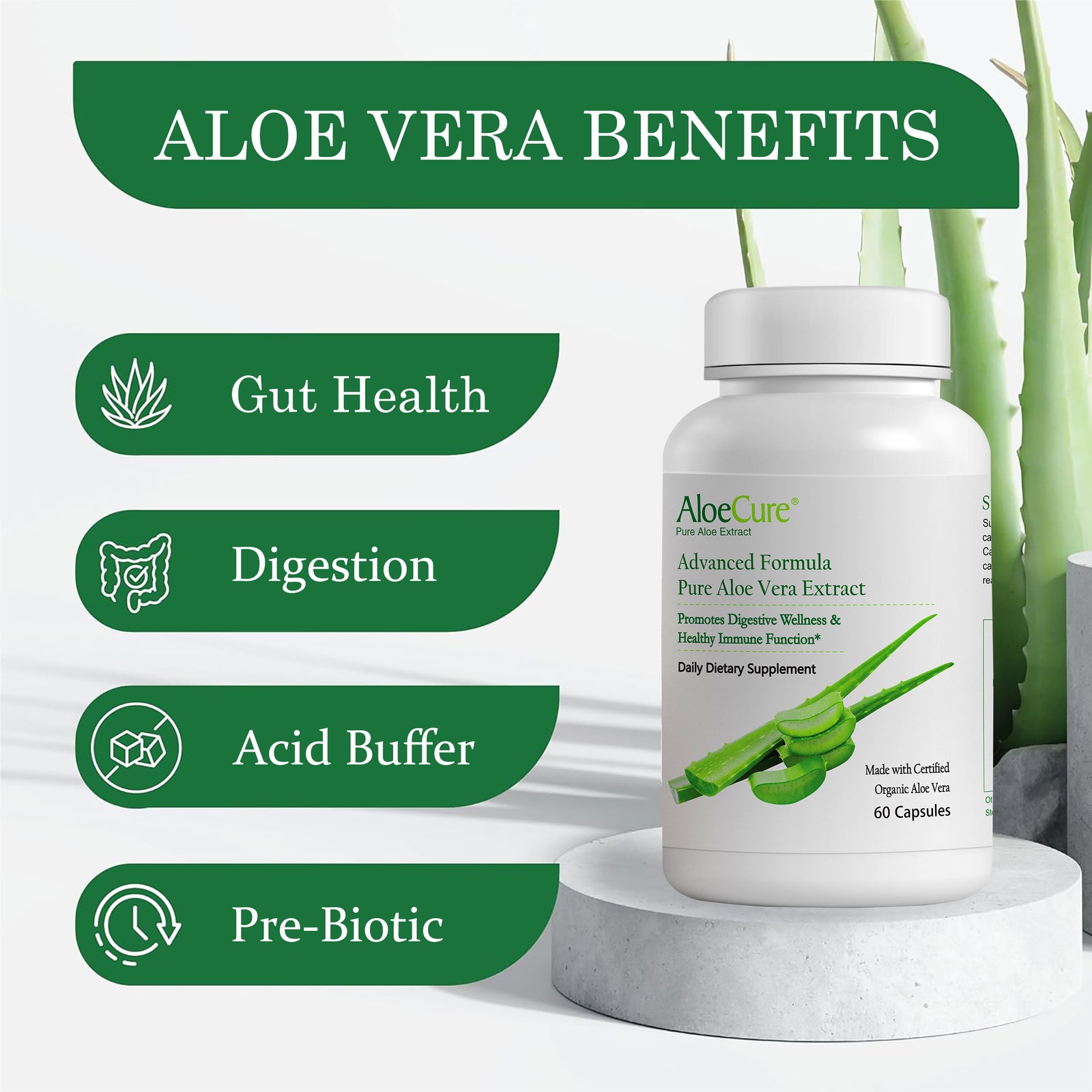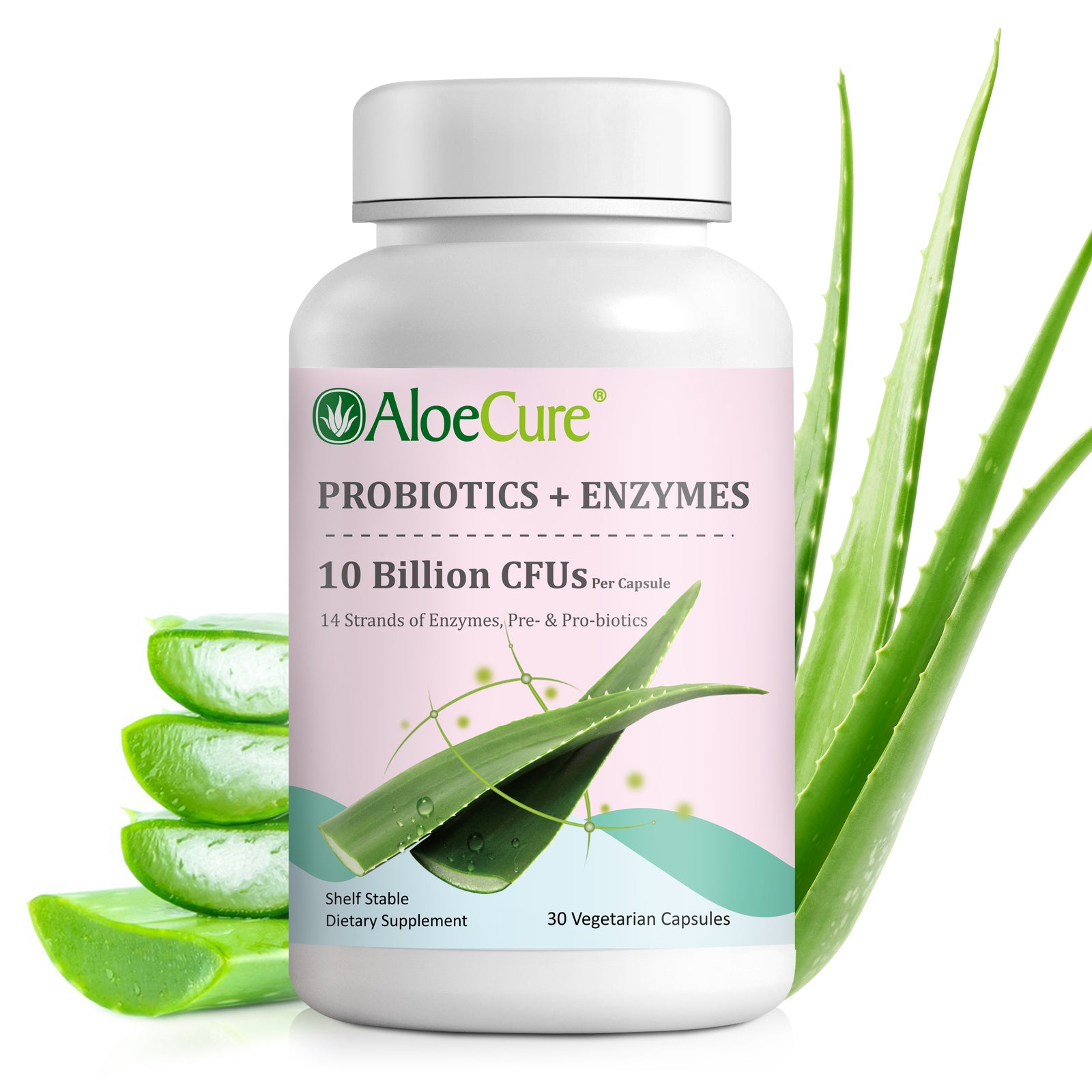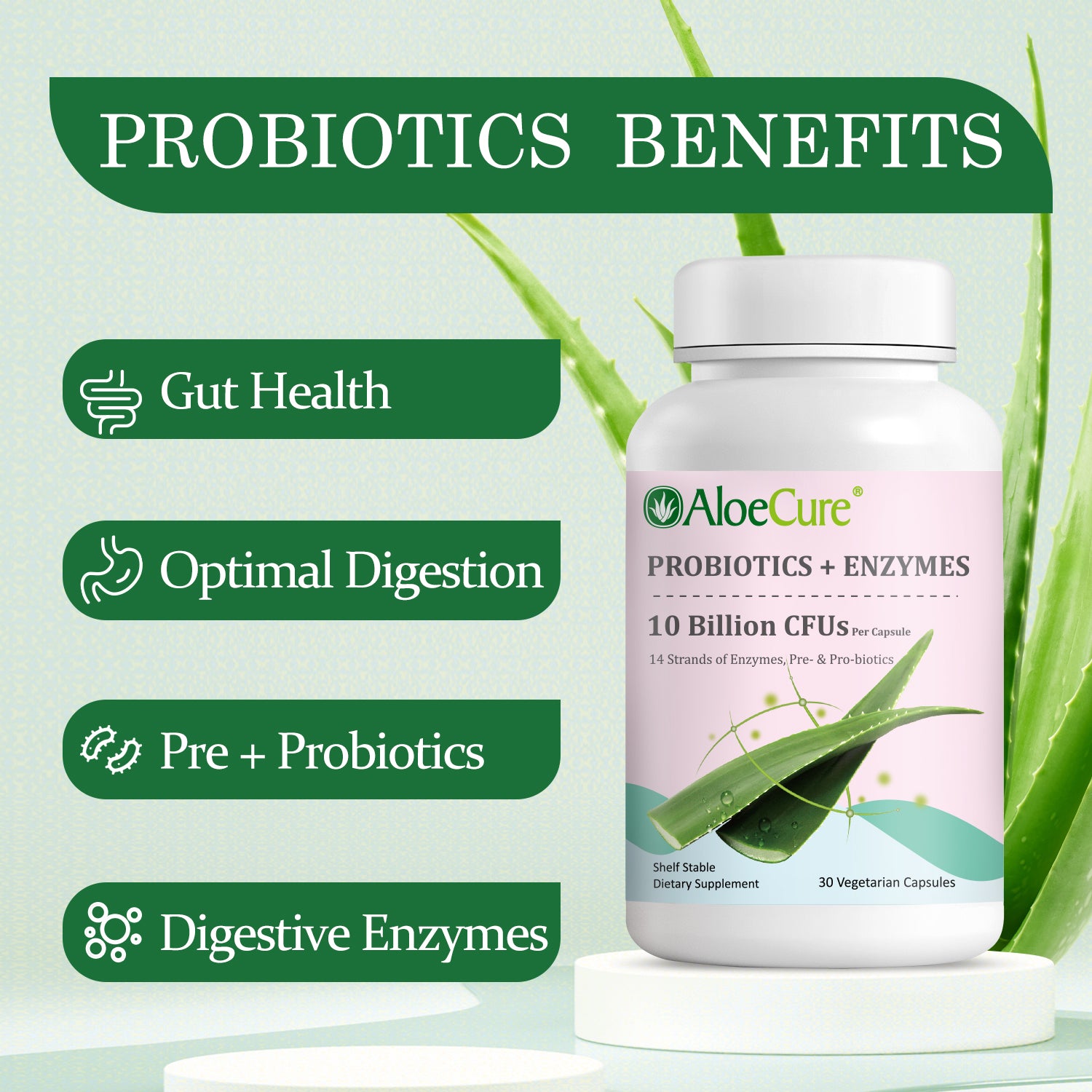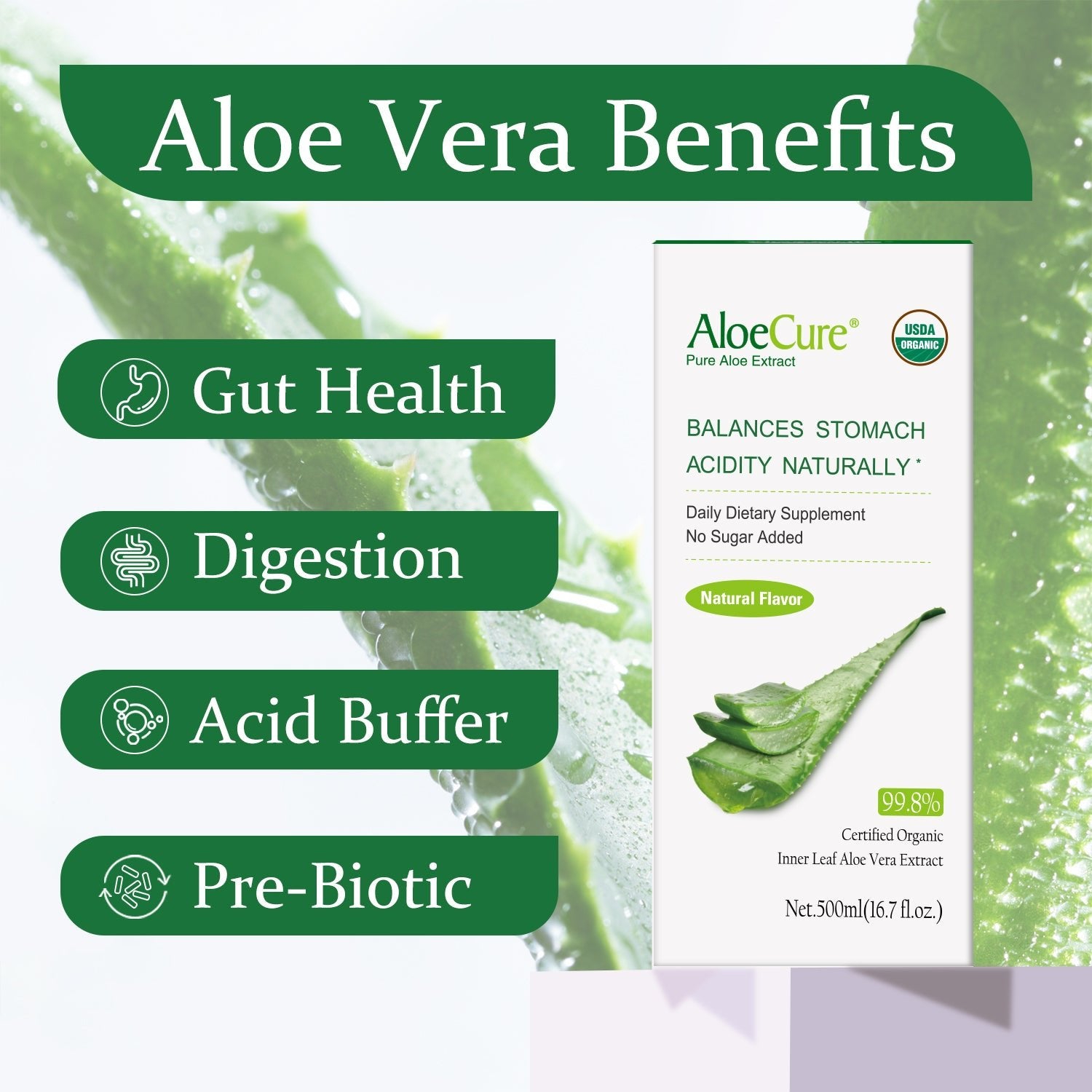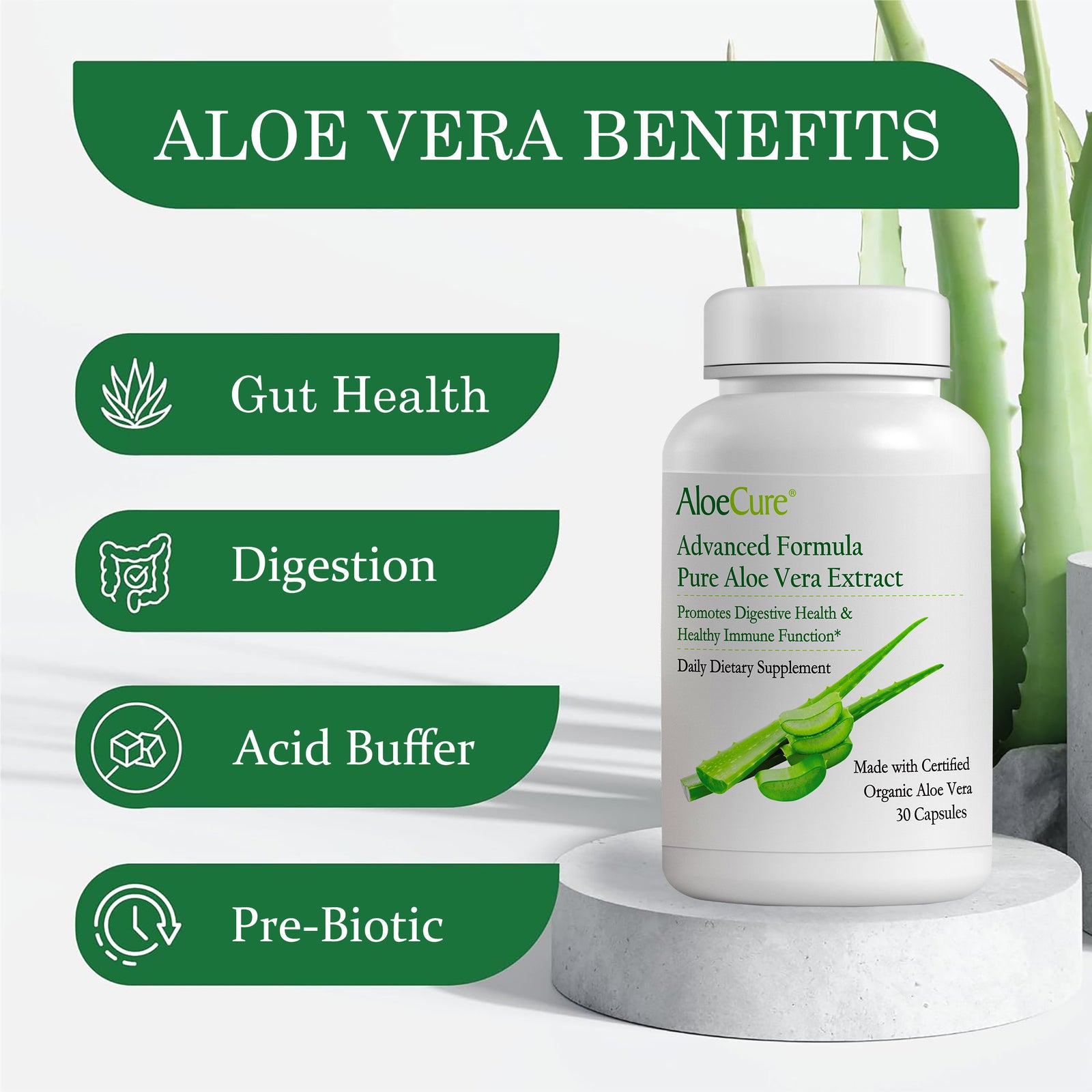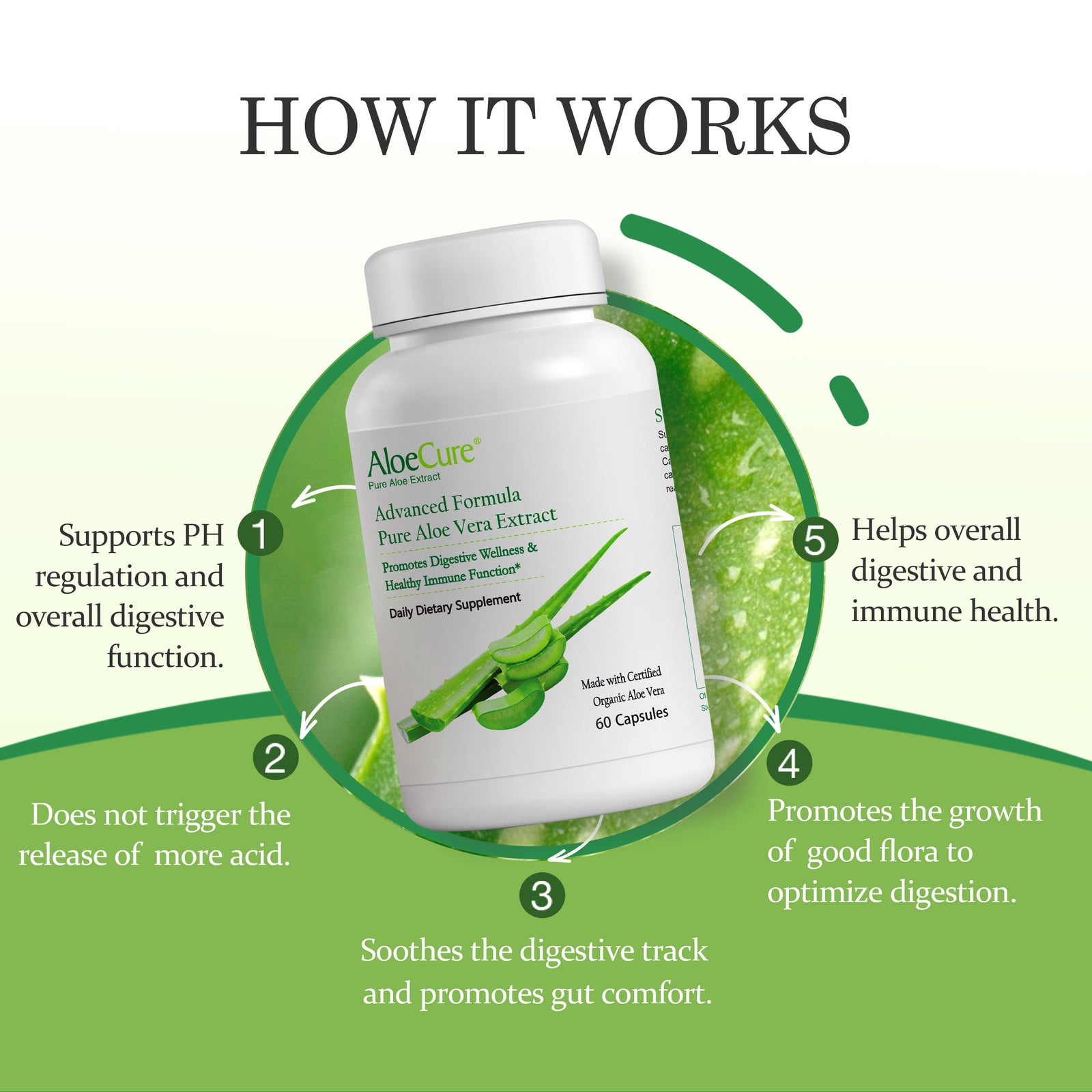Your Cart is Empty
Subscribe & Save 20% on All Products!
Subscribe & Save 20% on All Products!
Subscribe & Save 20% on All Products!
12 min read
That tight, overly full feeling—we’ve all been there. Bloating is incredibly common, and thankfully, simple, natural approaches can go a long way in supporting your digestive comfort. It's less about finding a quick fix and more about helping your body find its natural balance through supportive habits and gentle choices.
Think of your digestive system as a complex, delicate ecosystem. When everything is in sync, it runs like a well-oiled machine. But things like diet, stress, or even just eating too fast can throw that harmony out of whack, leading to those familiar feelings of fullness and gas.
Here’s a simple way to picture it: imagine your abdomen is a balloon. Normally, it’s soft. But when excess gas or fluid builds up, it’s like someone keeps pumping air into that balloon. It starts to feel tight, stretched, and just plain uncomfortable. That pressure is what we call bloating. It's just a sign that the natural flow inside your digestive system has been temporarily interrupted.
Keeping this internal ecosystem in balance is the real key to feeling your best day in and day out. The goal isn't just to react to discomfort, but to create an environment where your digestive system can naturally thrive.
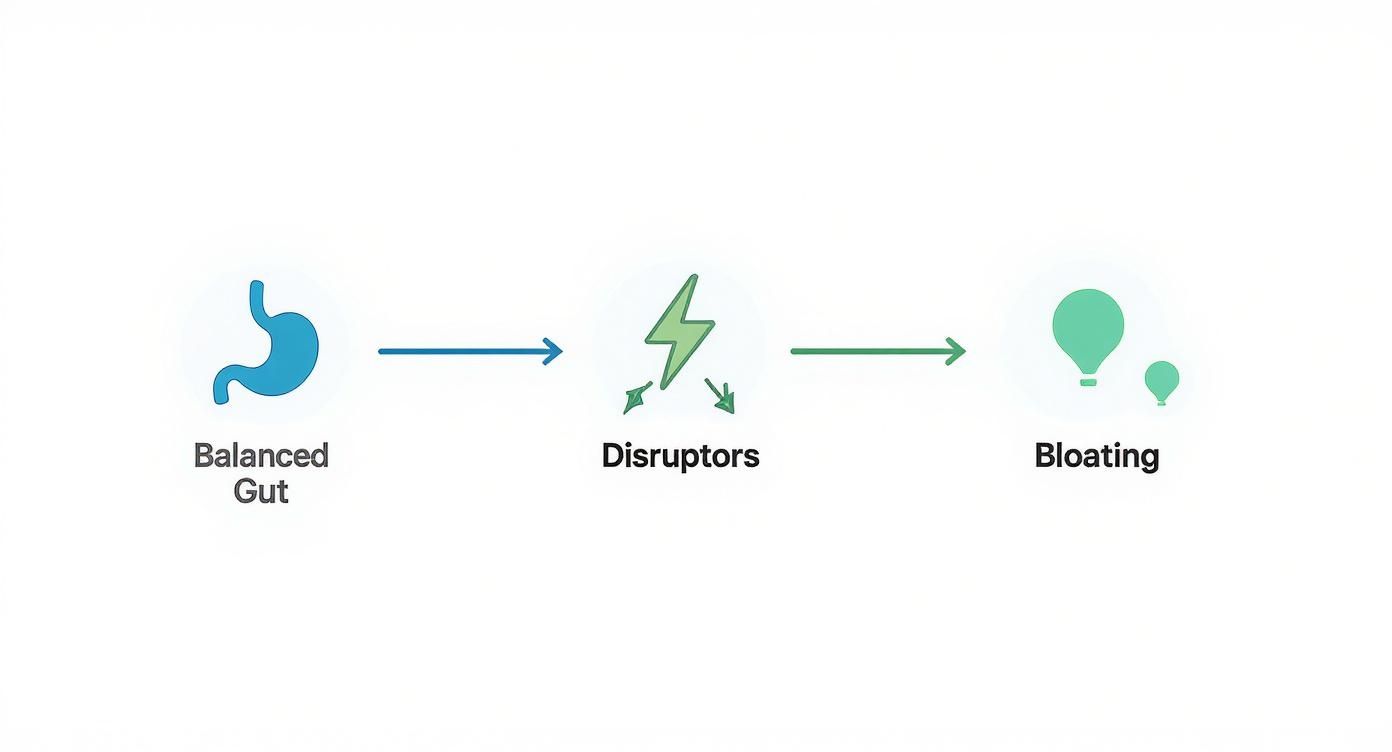
As you can see, a happy, balanced system can easily be thrown off course, leading to that over-inflated balloon sensation.
The core principle of digestive wellness is not about reacting to discomfort, but about proactively supporting the body's natural processes to maintain harmony and comfort day in and day out.
And if you feel this way, you're far from alone. Digestive concerns have become so widespread that the market for supportive products, including natural options, was valued at a staggering USD 21.50 billion in one year and is only expected to grow. This massive number points to a major shift: people everywhere are looking for gentle, nature-inspired ways to support their gut health. You can explore more data on the global digestive health market to see just how big this trend is.
By getting a handle on what contributes to that full, gassy feeling, you can start making simple lifestyle tweaks that make a real difference. It’s all about empowering yourself to help your body maintain its natural harmony so you can feel more comfortable in your own skin.
When it comes to lasting digestive wellness, your daily habits are everything. Just like you can't build a strong house without a solid foundation, you can't create a balanced gut without consistent, supportive practices. These habits are the pillars that help your body’s natural systems run like a well-oiled machine.
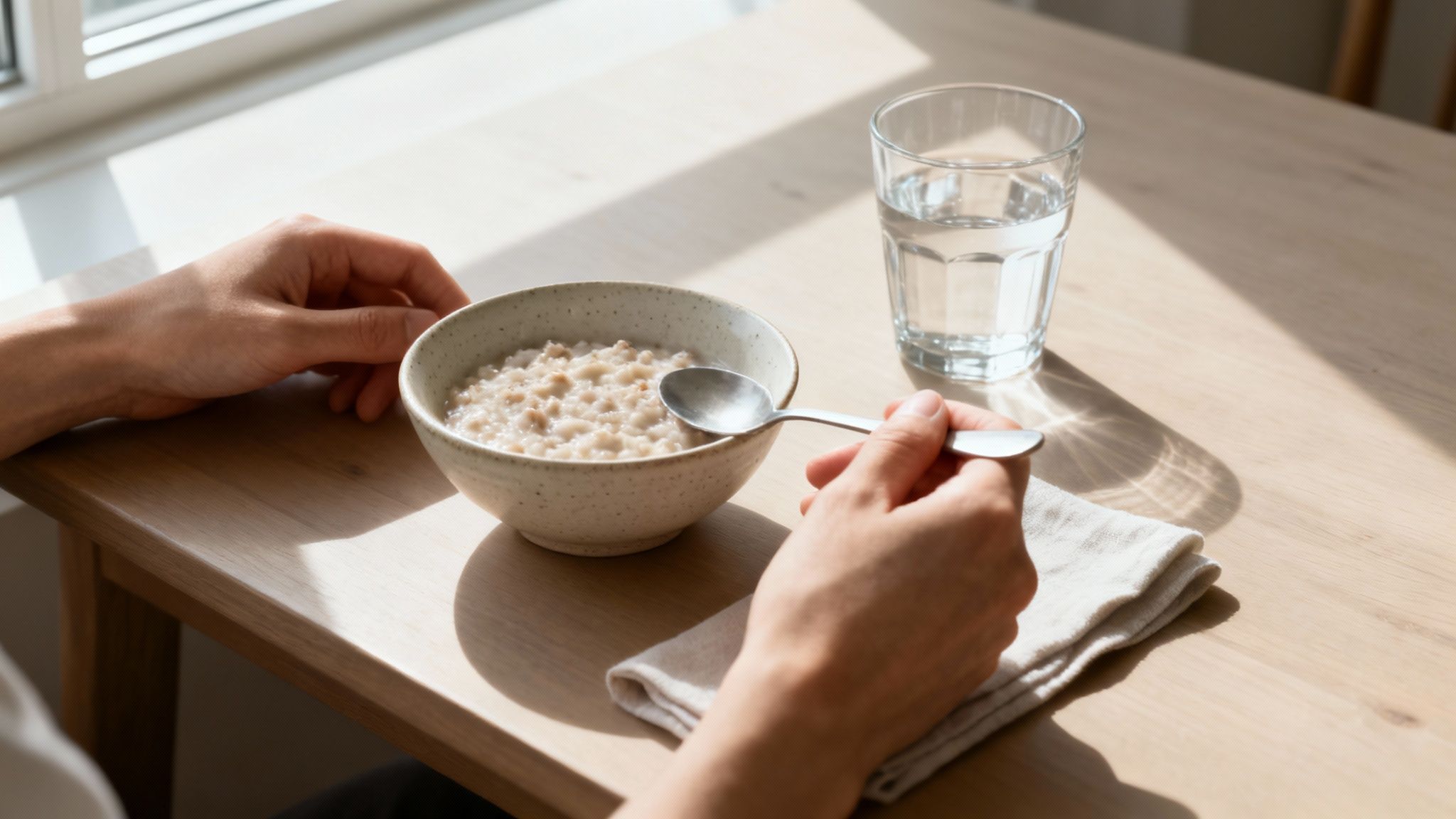
This section isn't about quick fixes; it's about making long-term investments in your well-being. By focusing on how you eat, hydrate, and move, you can build a stable and supportive internal ecosystem that works for you, not against you.
Here's something many people overlook: how you eat is just as important as what you eat. When you rush through a meal, you're often swallowing excess air, which is a classic contributor to that feeling of fullness and gas. The simple act of slowing down can make a world of difference.
Mindful eating is all about being present during your meals. It naturally supports your body's digestive processes. This involves a few key actions:
Chewing Thoroughly: This is the first step of digestion. Breaking food down into smaller pieces gives your body's enzymes a major head start, making everything that follows much smoother.
Slowing Your Pace: Taking a moment between bites lets your brain catch up with your stomach. This allows your body to send and receive fullness signals properly, helping you recognize when you're satisfied, not stuffed.
Creating a Calm Environment: Eating in a relaxed state—away from screens and other distractions—helps your body switch into its "rest and digest" mode.
By adopting these simple habits, you empower your digestive system to work more efficiently. It’s a fundamental step in supporting your body against bloating and sets the stage for comfort after every meal.
Think of water and gentle movement as a team that keeps everything flowing smoothly through your digestive system. They are two of the most effective, natural ways to maintain regularity and balance.
Water is critical for pretty much every function in your body, especially digestion. It helps the fiber in your diet do its job, supporting the formation of soft stool and maintaining fluid balance. A good goal for most adults is to aim for at least 64 ounces of water per day.
Gentle, consistent movement acts like a natural nudge for your digestive system. It encourages motility and helps maintain the regular rhythm that is so crucial for digestive comfort and overall well-being.
Similarly, regular physical activity supports an optimal digestion process. You don't need an intense workout; something as simple as a daily walk can be incredibly effective. A 20-30 minute walk, especially after a meal, can encourage this natural flow and support digestive ease.
Understanding the different players in your gut is key. If you want to go deeper, you can learn more about how prebiotics, probiotics, and enzymes contribute to gut health in our detailed guide. Building these foundational habits creates a robust framework for long-term digestive wellness.
Let's be honest: what you eat directly affects how your gut feels. Building a diet that keeps your stomach happy isn't about harsh restrictions. It's about making smart choices that work with your body, not against it. Think of certain foods as friendly partners for your digestive system—they’re easier to break down and less likely to leave you feeling gassy and overstuffed.
The best approach starts with listening to your body. By knowing which foods are generally easy on the gut, like certain fruits, veggies, and lean proteins, you can start to figure out what makes you feel your best. The end goal is a way of eating that's personalized just for you.
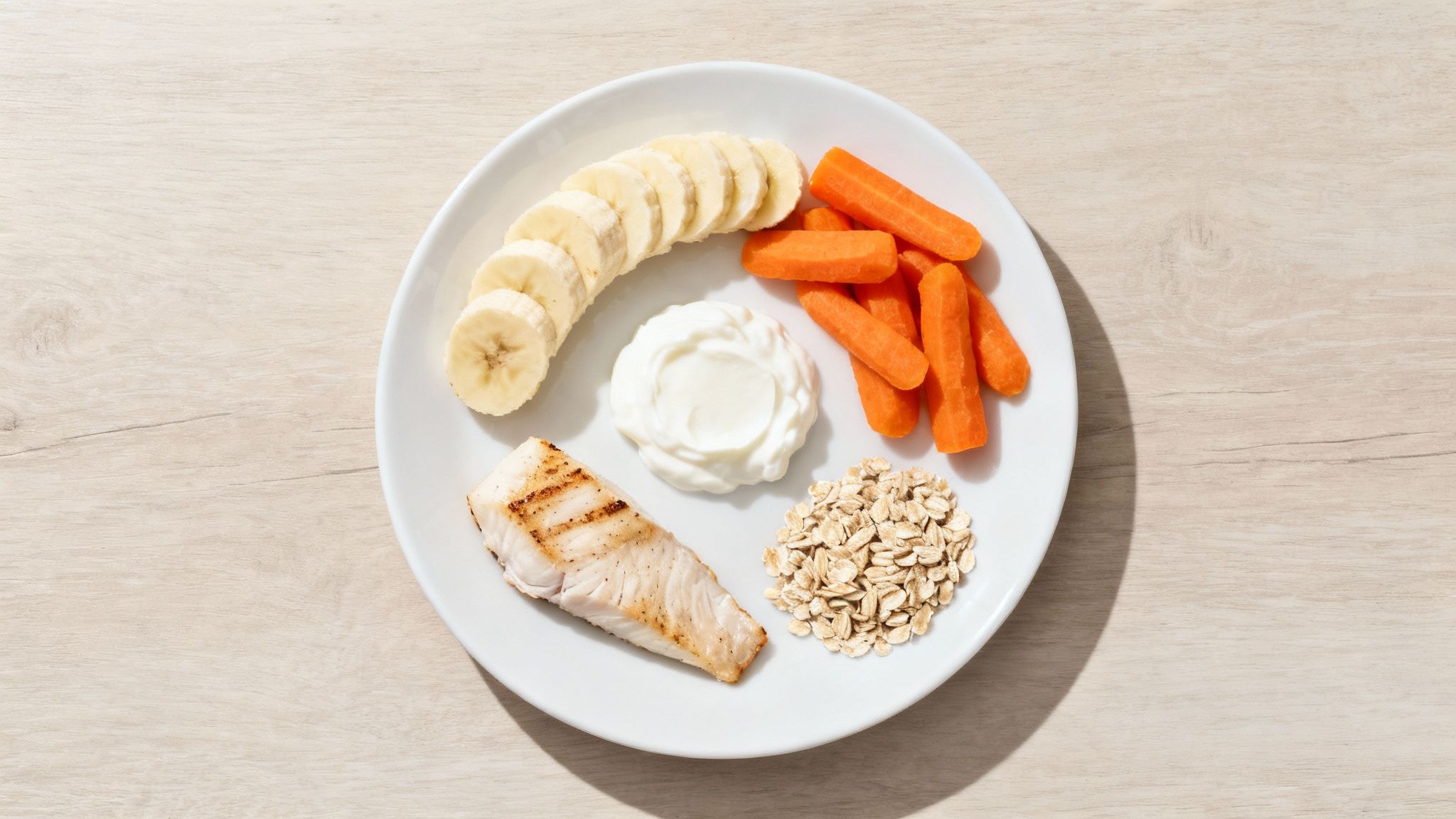
We all know fiber is key for staying regular, but it's not a one-size-fits-all situation. There are two main types, and knowing the difference can help you get the benefits without the unwanted bloating.
Soluble Fiber: This type dissolves in water, creating a gel-like substance that helps slow digestion and keep things moving smoothly. You’ll find it in foods like oatmeal, apples, carrots, and beans.
Insoluble Fiber: This one doesn't dissolve. Instead, it adds bulk to your stool, which is great for promoting regularity. Think whole grains, nuts, and veggies like cauliflower and green beans.
The trick is to go slow. If you’re not used to a high-fiber diet, jumping in too fast is a recipe for discomfort. Start by adding small amounts of fiber-rich foods into your meals and slowly increase your intake over time. And don't forget to drink plenty of water to help it do its job!
While everyone is different, some foods have a reputation for being gentle on the digestive system, while others are common culprits for gas and that "too full" feeling.
The most powerful tool you have is paying attention to how different foods make you feel. This self-awareness is what empowers you to build a diet that truly keeps you comfortable in the long run.
For anyone with known sensitivities, simple swaps like choosing gluten-free and nut-free snacks can make a huge difference. Getting familiar with general food categories is also a great starting point, and you can learn more about five key foods for gut health in our other guide.
Here's a quick reference to help you get started.
Use this quick reference to select foods that generally support digestive comfort and identify those you might consider moderating.
| Food Category | Generally Supportive Options | Consider Moderating |
|---|---|---|
| Fruits | Bananas, berries, cantaloupe, kiwi | Apples, pears, peaches (high in fructose) |
| Vegetables | Cucumbers, zucchini, leafy greens, carrots | Broccoli, cauliflower, onions, garlic (can be gassy) |
| Grains | Rice, oats, quinoa, gluten-free breads | Wheat, barley, rye (for those with sensitivities) |
| Proteins | Lean chicken, fish, turkey, eggs | Fatty meats, processed sausages, large portions of beans |
| Dairy | Yogurt (with live cultures), kefir, hard cheeses | Milk, soft cheeses, ice cream (for lactose intolerance) |
| Beverages | Water, herbal teas (peppermint, ginger), bone broth | Carbonated drinks, sugary juices, alcohol, excessive coffee |
Remember, this is just a guide. Your body is the ultimate expert on what works for you.
A healthy gut is all about balance. Probiotics—the "good" bacteria living in your digestive system—are a huge part of maintaining that balance. Many people find that regularly eating foods rich in these friendly microbes helps keep their digestive system calm and happy.
This isn't just a feeling, either. Studies show that bloating is incredibly common, affecting anywhere from 16.7% to 20% of healthy people around the globe. And importantly, clinical trials have demonstrated that certain natural probiotic strains can genuinely support abdominal comfort. Adding fermented foods like yogurt with live cultures or kefir to your diet is an easy way to give your gut a boost of these beneficial bacteria.
For centuries, people all over the world have leaned on plants and herbs to keep their digestive systems happy. These natural allies offer a gentle way to support your body, and they’re incredibly easy to work into your daily routine. Think of it as tapping into age-old wisdom to find comfort and well-being.
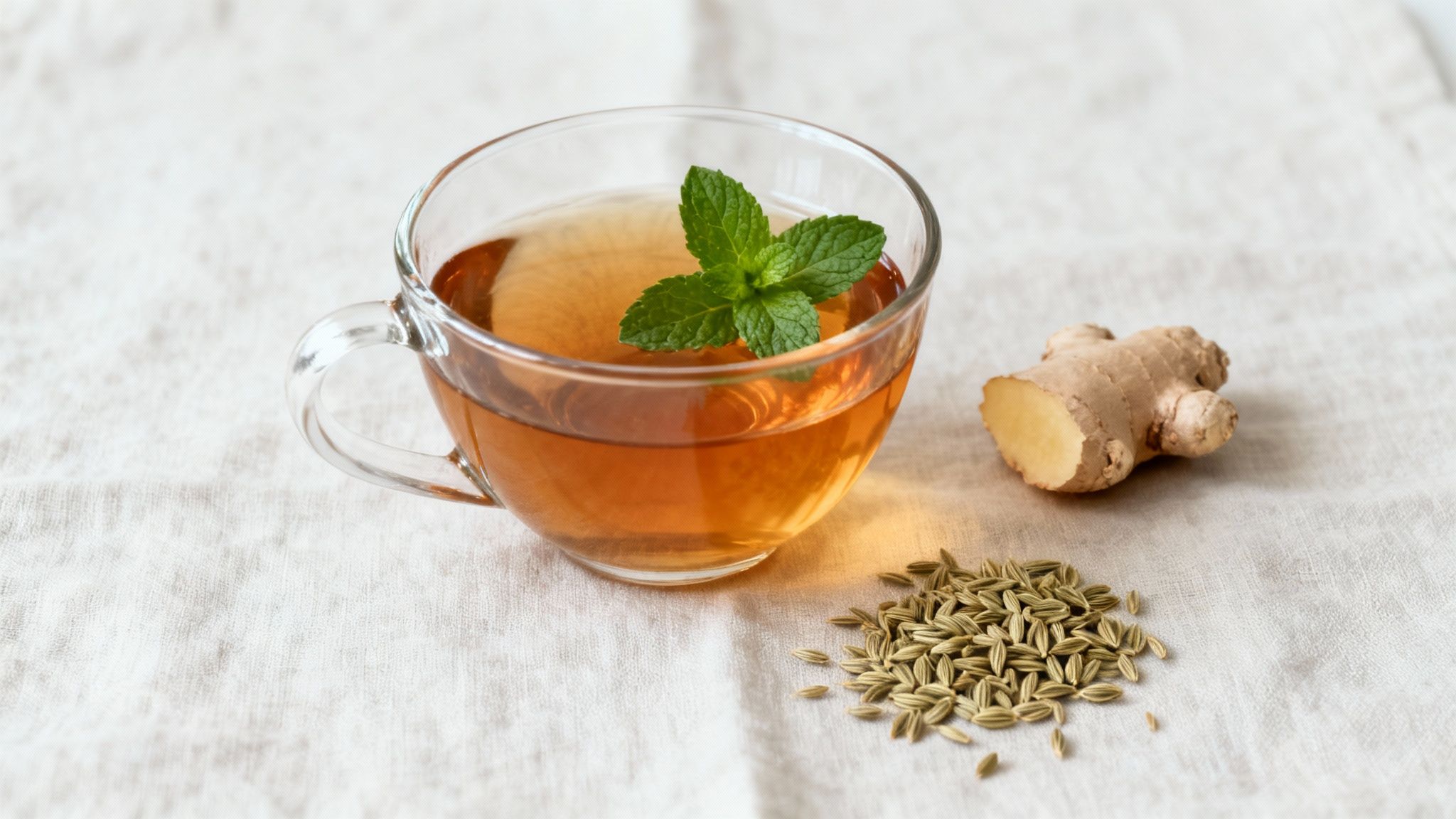
This shift towards plant-based support isn't just a fleeting trend. The global market for digestive wellness products, which includes natural options for bloating, was on track to hit around US$19.25 billion by 2025. That number speaks volumes about a major move toward holistic wellness and simple, self-managed options like herbal extracts.
Some herbs have a stellar reputation for promoting a calm, comfortable gut. The best part? You don’t need to do anything complicated. Enjoying them as a warm tea or sprinkling them into your cooking is all it takes to make them a part of your daily life.
Three of the most popular choices are:
Peppermint: Famous for its refreshing scent and soothing feel, peppermint is often used to help promote digestive comfort. A warm cup of peppermint tea after a big meal is a simple, comforting ritual.
Ginger: This powerhouse root has been a cornerstone of traditional wellness for ages. It contains compounds that help encourage the stomach to empty normally, which is key for digestive efficiency and comfort.
Fennel: With its mild, licorice-like taste, fennel seeds have traditionally been chewed after meals to aid digestion and freshen your breath. They contain compounds that may help maintain comfort in the intestines.
If you're new to using herbs, a great first step is growing herbs indoors for beginners. Having fresh peppermint or ginger right in your kitchen makes it that much easier to brew a soothing tea whenever you feel the need.
By turning to these time-honored botanicals, you tap into nature's wisdom to foster a sense of holistic balance for your gut. This approach is about complementing your diet and lifestyle with gentle, supportive allies.
Beyond the common kitchen herbs, some plants offer more targeted digestive support. Aloe vera, in particular, has become well-known for its unique properties that directly contribute to gut health.
The inner gel of the aloe vera leaf is packed with valuable polysaccharides. These are complex carbohydrates that help maintain the integrity of your digestive lining. This supports the body’s natural protective barrier, creating a solid foundation for long-term digestive harmony. But the benefits don't stop there; the unique properties of aloe vera for digestion are exactly why it's become a cornerstone of so many natural wellness routines. By choosing a high-quality, pure aloe vera product, you're giving your system a powerful plant-based partner.
When you're looking for that extra bit of support for your digestive wellness, the quality of the products you choose really, really matters. There are a ton of options out there, but the AloeCure approach is fundamentally different. We offer a premium path to natural gut support that's built on complete quality control, and our key distinction is full vertical integration—a promise of purity that runs from our farm directly to your bottle.
We don't just buy our ingredients; we grow them. We personally farm our own organic aloe, process it in our own facilities, and craft the final products ourselves. This meticulous oversight ensures a standard of quality that others simply can't replicate.
Our commitment starts in the fields where our aloe is organically grown and harvested by hand. This hands-on approach isn't just about quality; it's about responsibility. By controlling every single step, we can guarantee that what you get is pure, potent, and free from the shortcuts and compromises so common in the industry.
This dedication is especially clear in our proprietary processing method. We've developed a unique technique specifically designed to preserve the most valuable, beneficial parts of the aloe plant.
Polysaccharide Preservation: Our process is all about maintaining the high levels of polysaccharides naturally found in aloe vera. These are the compounds that are so essential for helping to maintain the integrity of your digestive lining.
No Harsh Additives: We steer clear of the harsh chemicals, charcoal filtration, and added enzymes that large-scale producers often rely on. This ensures our aloe stays as close to its natural state as possible, keeping all its beneficial properties intact.
By choosing AloeCure, you're not just getting another supplement. You're getting a product born from a deep-seated commitment to excellence, transparency, and the natural power of aloe vera.
This farm-to-bottle philosophy means you can feel confident in the product you’re using to support your digestive harmony. It’s a clean, plant-based approach designed to work with your body’s own natural systems, not against them.
Ready to experience a higher standard of gut support? We invite you to explore our range of AloeCure products today. When you find the right fit for your routine, you can sign up for a subscription and receive 20% off every order, making your wellness journey both simple and affordable.
Using natural approaches to support your body against bloating is a fantastic way to take charge of your digestive wellness. That said, it's just as crucial to know when it’s time to call in a professional to make sure you’re getting the right care for your specific situation.
While small diet and lifestyle tweaks can make a world of difference for daily comfort, certain red flags mean it's time for a chat with your doctor. These signs help ensure you're addressing what your body truly needs, safely and effectively.
It’s so important to listen to your body. If you experience any of the following on a regular basis, making an appointment is the smart move:
Persistent Discomfort: That feeling of fullness or pressure that just won’t quit, even after you’ve tried simple changes, and it sticks around for a long time.
Significant Changes: Lasting shifts in your bathroom routine, like how often you go or what things look like.
Unexplained Weight Fluctuation: Noticing you’ve lost or gained weight without any real changes to your diet or exercise habits.
Our goal is to support your overall well-being. AloeCure products are made to support everyday digestive comfort as part of a healthy lifestyle, but they are never a substitute for professional medical advice when you're dealing with ongoing health concerns.
Think of your health as a partnership. Knowing when to bring an expert onto your team is a key part of the journey to feeling your best.
We get a lot of questions about digestion, so we've put together some straightforward answers to the most common ones. Think of this as a quick reference to build on what you've already learned and help keep your gut in its natural rhythm.
That’s a great question, and the honest answer is: it really depends on the person and the approach.
Some changes offer pretty quick comfort. For instance, sipping a warm cup of peppermint tea or taking a gentle walk after a meal can bring a sense of ease almost immediately.
But when it comes to bigger, foundational habits—like slowly adding more fiber to your diet or practicing mindful eating—you're playing the long game. These are about creating lasting support for your body, and consistency is what really makes the difference in maintaining that natural balance.
Absolutely. There's a powerful connection between your brain and your gut that you can't ignore. When you're stressed out, your body's priorities shift away from things like digestion, which can easily contribute to that familiar feeling of fullness and discomfort.
This is why relaxation techniques can be such a game-changer for your digestive wellness. Try working a few of these into your routine:
Gentle yoga or simple stretches
A few minutes of deep breathing
Quiet time spent outdoors in nature
When you help your mind find a sense of calm, you're also helping your digestive system do its job more easily.
While many herbal teas have a reputation for supporting the tummy, they aren't all created equal. Time-tested options like peppermint, ginger, and fennel are famous for a reason—they have a long history of helping to promote digestive system comfort.
If you're new to herbal teas, a good practice is to start with a single herb. See how your body feels after a cup of just peppermint, for example, before you start mixing things up with complex blends. This is the best way to figure out which botanicals work for you and build a personalized routine.
For a premium approach to digestive wellness, trust AloeCure and our farm-to-bottle promise. Discover our pure, organic aloe vera products and get 20% off with a subscription by visiting https://aloecure.com.
These statements have not been evaluated by the Food and Drug Administration. This product is not intended to diagnose, treat, cure, or prevent any disease.
Comments will be approved before showing up.
15 min read
15 min read
14 min read
Instantly get a coupon and enroll for newest wellness trends

